
As I started testing the Orbi 970, I realized I haven't used a mainstream router for a few years now. In fact, the last Netgear router I used with any amount of regularity was the Nighthawk R7000, and that's a decade old. With Netgear doubling down on mesh systems in that time, I was keen on taking a look at what the brand has to offer with Wi-Fi 7. The standard hasn't been finalized just yet, but that hasn't prevented phone manufacturers from rolling out client devices, and networking brands to release routers that leverage Wi-Fi 7.
The Orbi 970 is unlike any other router I've used thus far. For starters, it costs a truly ridiculous amount of money — a single unit retails for $899, and the configuration I tested is $2,299. You're essentially getting the fastest router in the world, but still, that's more than what a prosumer network costs to set up.
But the allure of the Orbi 970 is that you don't have to deal with the hassle of configuring a home network from scratch; you don't need to worry about access points, switches, PoE cables, and so on — just plug in the router to your modem and any satellites as needed, and you've got incredibly-fast connectivity that extends to all corners of your home.
You don't need a Wi-Fi 7 router right now as there are limited devices that are based on the standard. That will change over the next two years as the best Android phones and other devices start integrating Wi-Fi 7 modems, but if you're an enthusiast and want to make the switch to the latest wireless standard right away, here's what you should know about Netgear's latest and greatest mesh system.
Netgear Orbi 970 (RBE973S): Specs, price, and release date
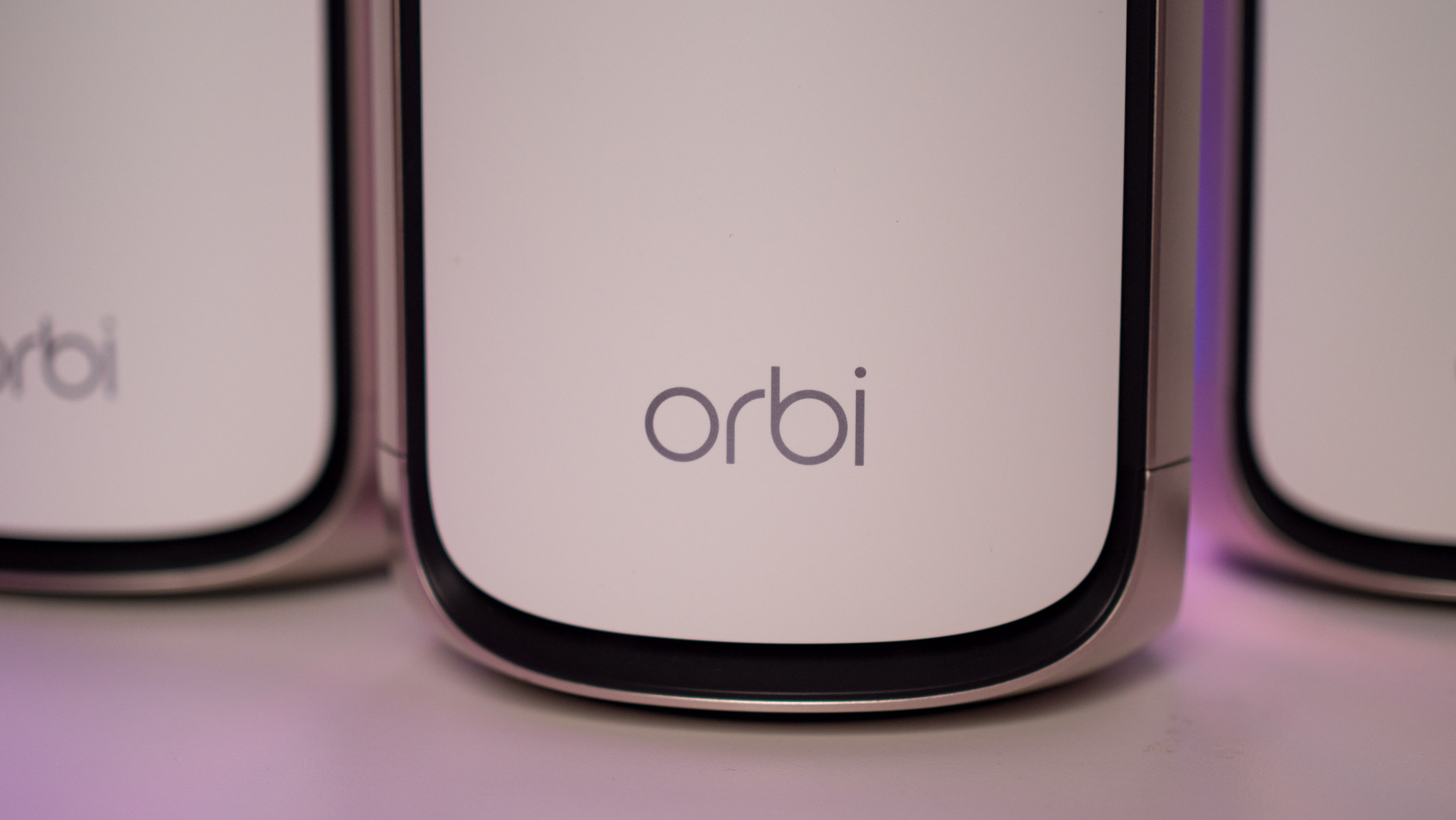
Netgear launched the Orbi 970 in November 2023, and the mesh system is now available in North America. I tested a 3-pack configuration (RBE973S) that's designed to cover up to 10,000 sq. ft., and it retails for $2,299. Netgear also sells a pack of two that covers up to 6,000 sq. ft., and that will set you back $1,699. And if you need an additional satellite, each unit is $899.
The mesh system is available in white and black models, with the latter exclusive to Netgear's store.
Netgear Orbi 970 (RBE973S): Design
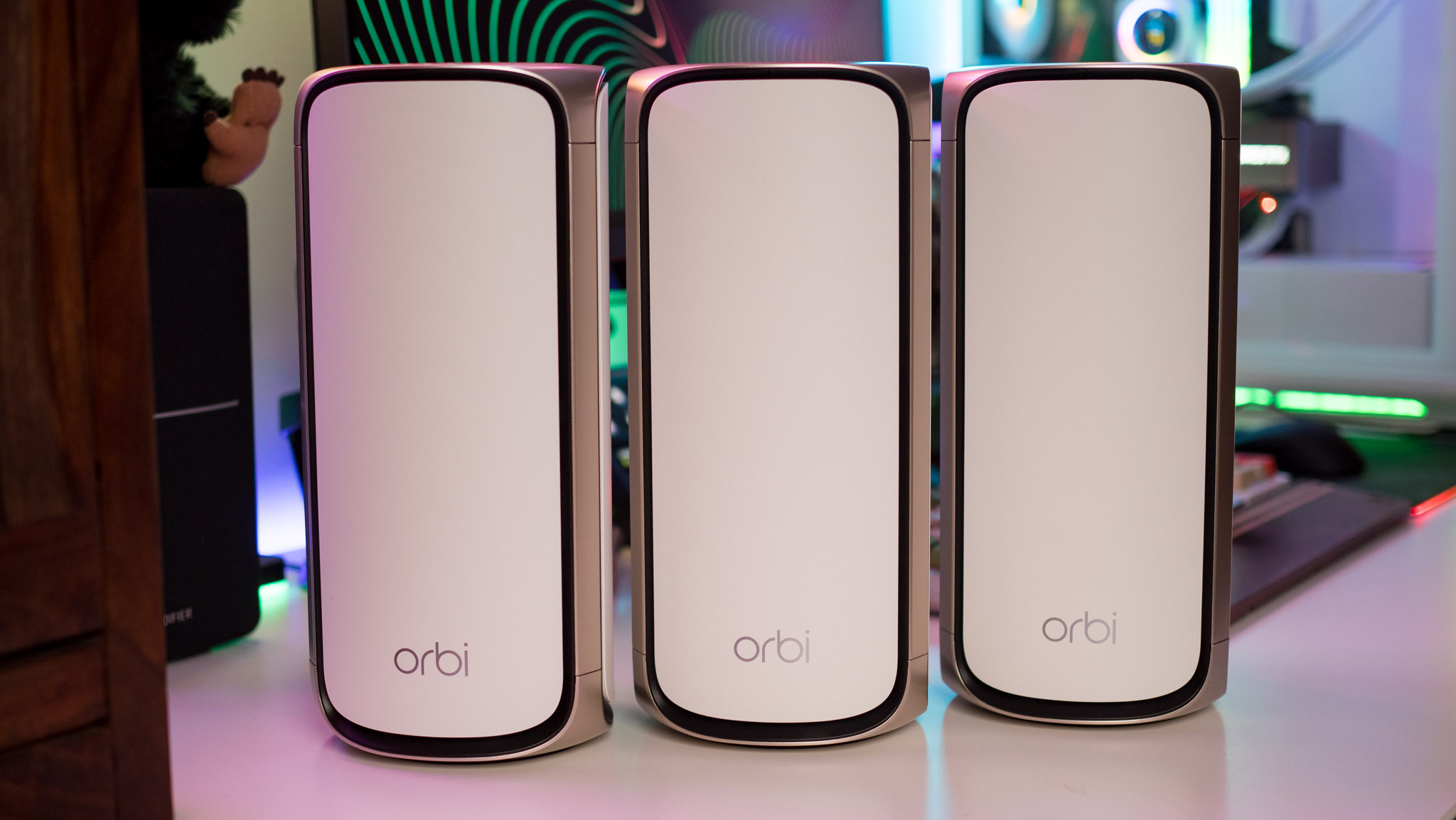
I must've missed the memo where router brands got together and decided to make products that look good, because the Orbi 970 definitely has a lot going for it in terms of the design. Unlike standalone routers that can just be tucked away in a corner, mesh systems are inherently more visible, so it's a good thing that they have decent designs now.

The Orbi 970 has a white design that looks elegant, and the gold trim around the sides gives it an upmarket look — it definitely looks like a high-end router. The cylindrical design houses 12 high-gain antennae that are hidden within the chassis, and Netgear says it uses a custom design to ensure each unit delivers 360-degree coverage. The antennae are located well above the internal circuitry so as not to cause any signal interference.
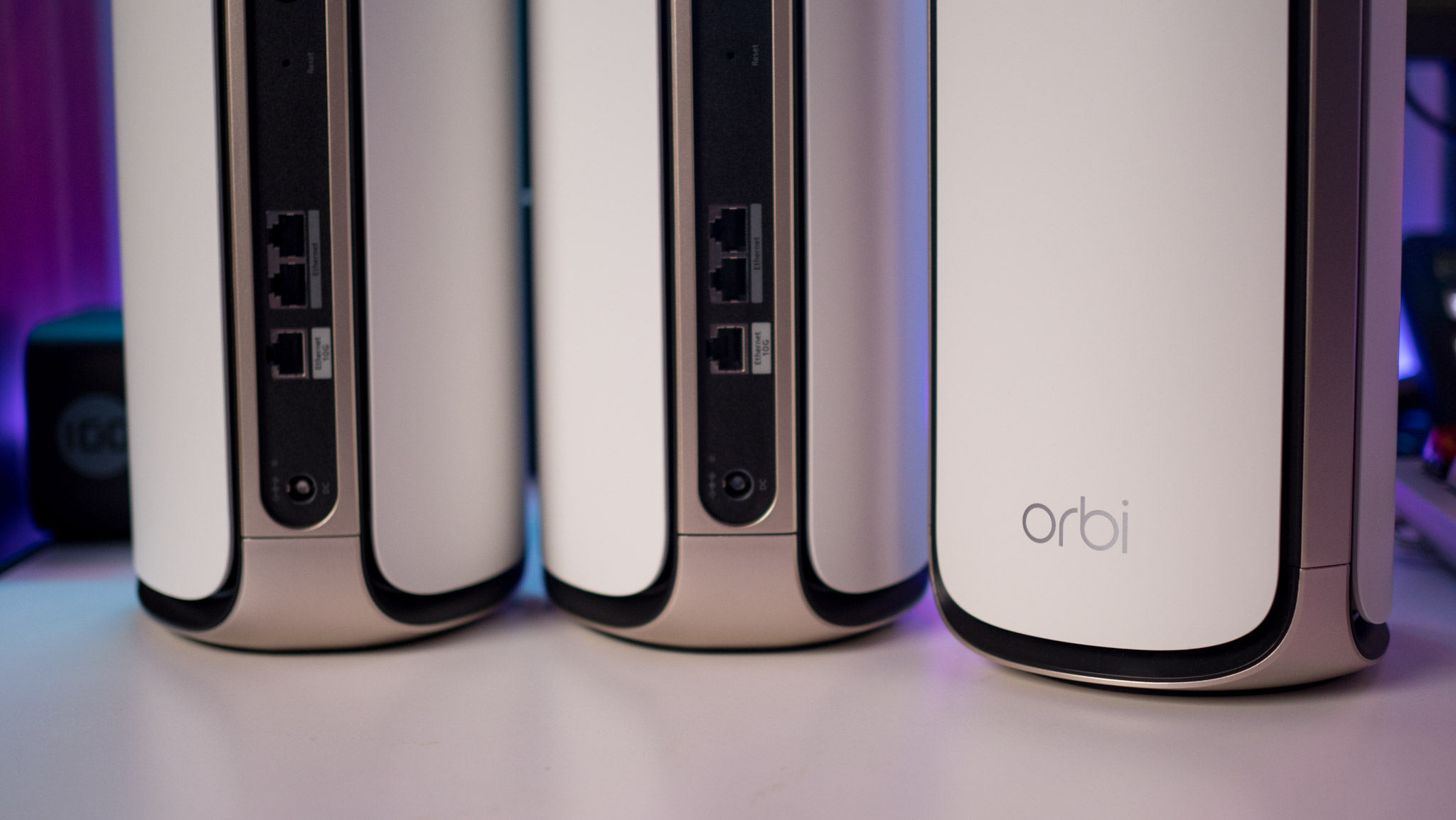
Each unit is cooled passively, and there are heatsinks that dissipate heat away from the internals. If you're not sold on the white aesthetic, Netgear has a black variant with grey accents that's a bit more discreet. The satellites have the same design as the router, and the only difference between the two is the port configuration.
Netgear Orbi 970 (RBE973S): Ports and connectivity
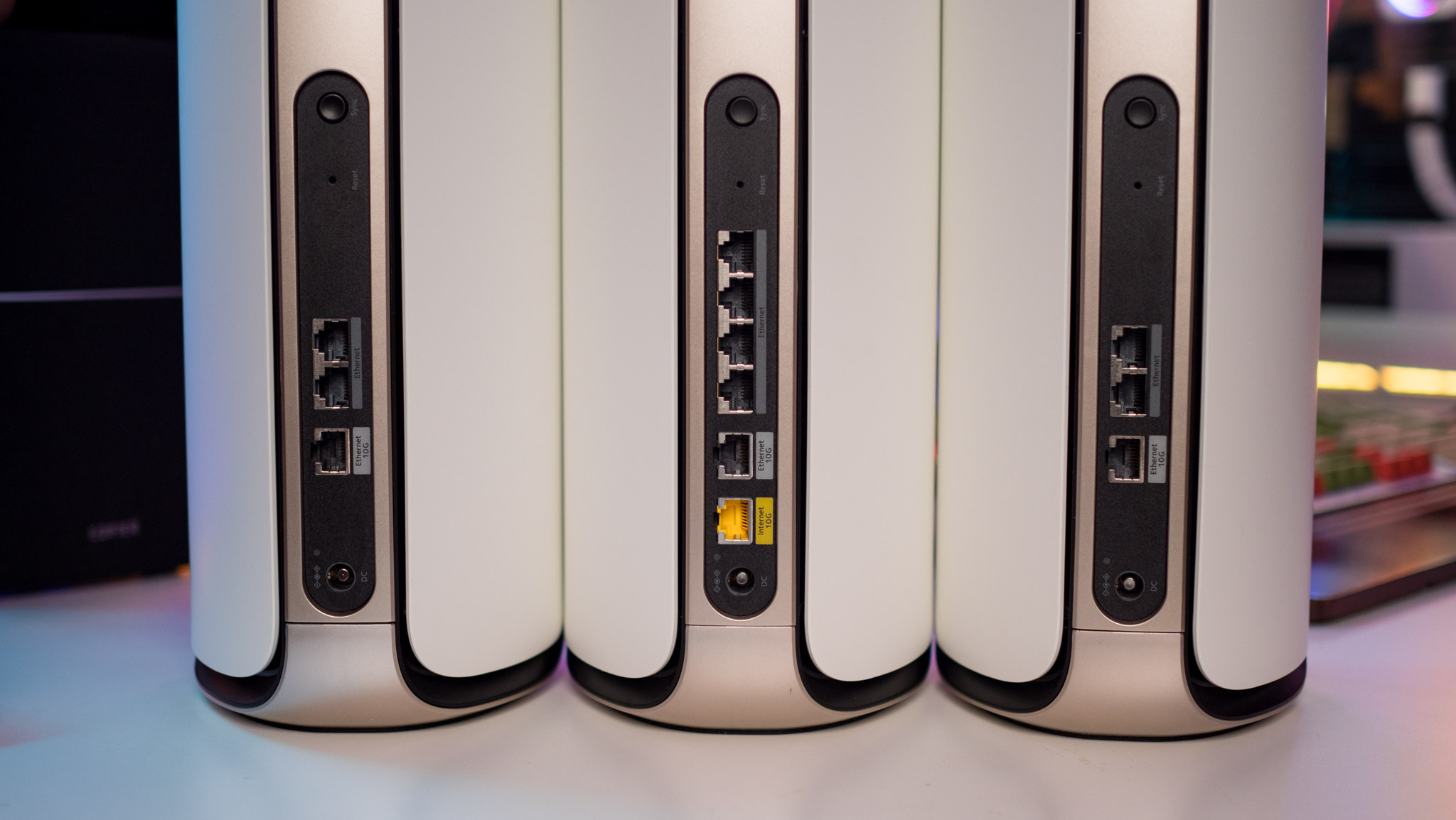
The Orbi 970 is a BE27000 class device, meaning it can deliver throughput of 27Gbps. It has quad-band connectivity that sees one 2.4GHz band, dual 5GHz bands, and a 6GHz band. One of the 5GHz bands is a dedicated wireless backhaul, and Netgear is using a portion of the 6GHz band towards this as well, calling it Enhanced Dedicated Backhaul.
This relies on a new mode available in Wi-Fi 7 called multi-link operation, which allows client devices and satellites to connect to more than one band at once, leading to better throughput and lower latency. Think of it as a wireless version of Link Aggregation, which combines two Ethernet ports to deliver double the bandwidth. Going this route allows Netgear to deliver better bandwidth over a wider range, dynamically adjusting channel width.
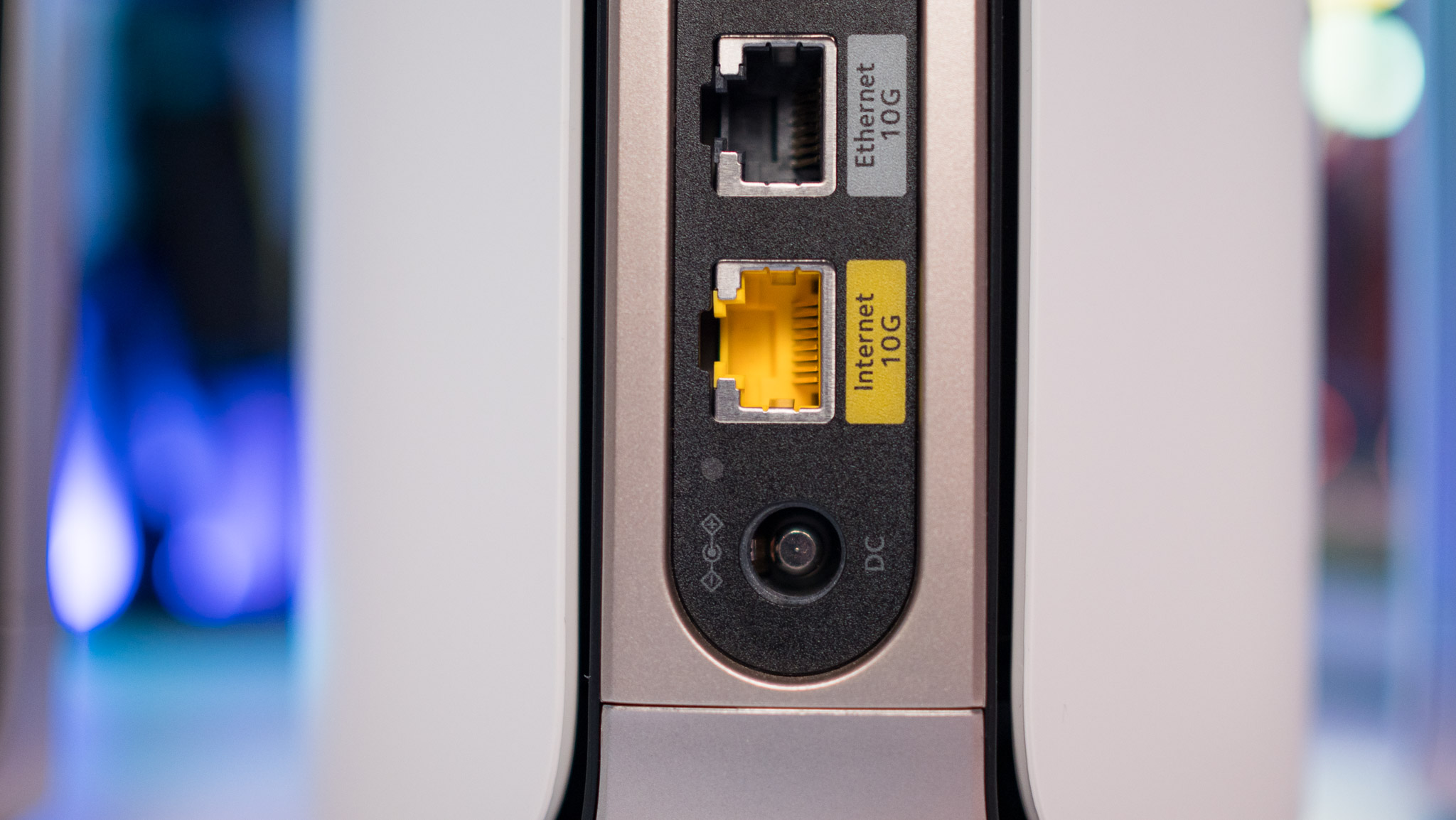
All radios have 4x4 streams, and the Orbi 970 is powered by a quad-core 2.2GHz chipset along with 2GB of RAM and 4GB of flash memory. The 2.4GHz band goes up to 1,174Mbps, the 5GHz band that serves as the fronthaul has 160MHz channels and goes up to 5,765Mbps, the other 5GHz band has 240MHz channel width and hits 8,674Mbps, and the 6GHz band can go up to 11,530Mbps over 320MHz.
When it comes to ports, the Orbi 970 router comes with a single 10GbE WAN and 10GbE LAN ports, and you get four 2.5GbE LAN ports as well. The satellites have a 10GbE port in addition to dual 2.5GbE ports, so you can set up a 10GbE wired backhaul without too much of an effort. The only quibble in this area is that as the route has a single 10GbE port, you will need to use a switch if you plan to connect both satellites.
Netgear Orbi 970 (RBE973S): Features
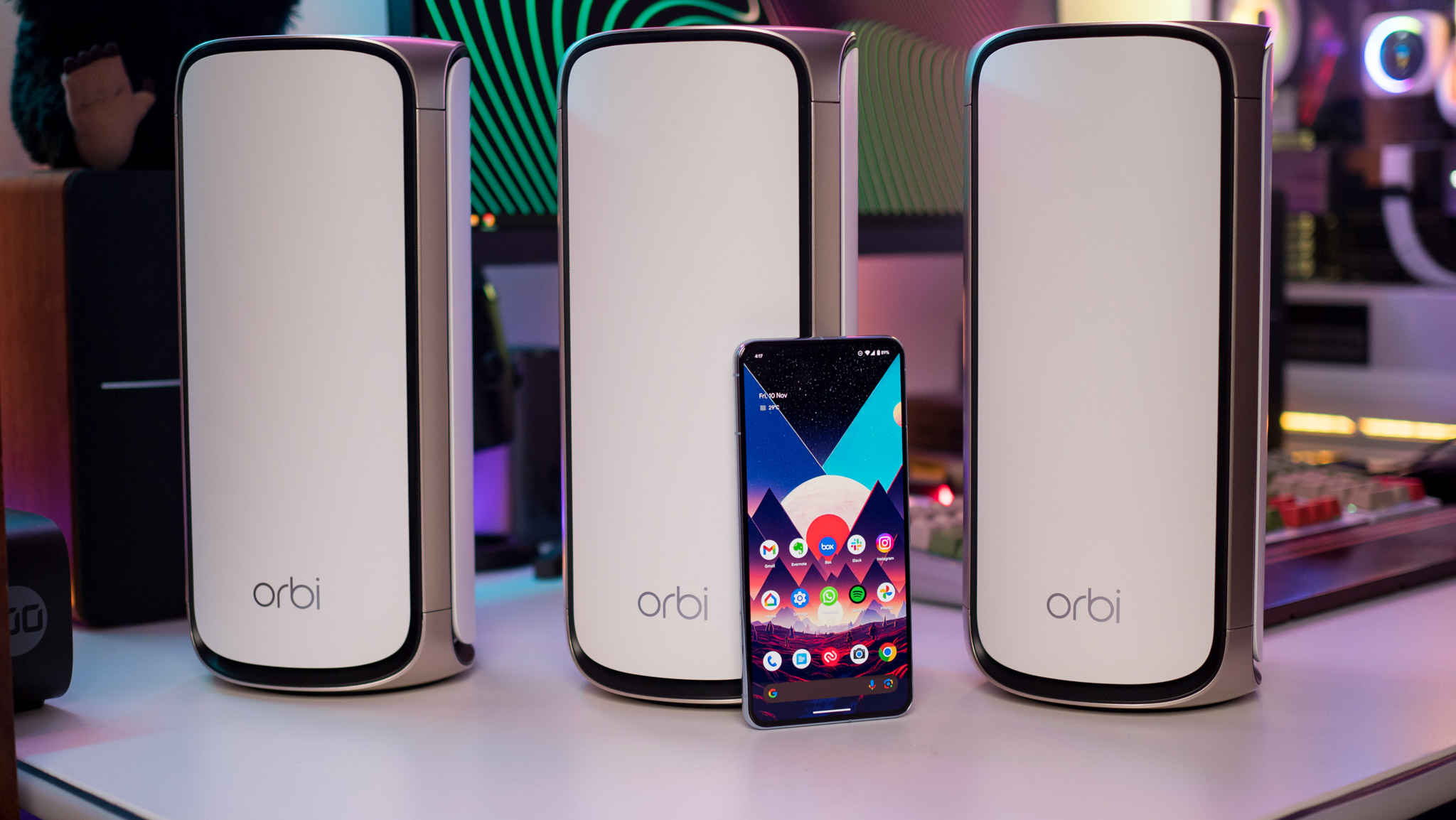
Convenience is one of the biggest reasons for getting a mesh system, and the Orbi 970 is straightforward to configure. You can use the Orbi mobile app to connect to the router and set it up on your home network, or you can use the web interface. I went with the mobile app, and quickly encountered a shortcoming when naming the SSID — it wouldn't let me use two words. This is a bizarre limitation to say the least, so I had to switch to the web interface to set up the router.
You can set up a home network, guest network, and an IoT network that uses the 2.4GHz band. Another annoyance in this area is that you don't get the option to create an SSID with a particular band; all of that is handled automatically, so all bands are broadcast under a single SSID that dynamically changes based on signal strength.
Initial configuration takes about 10 minutes, but it was a hassle to set up the satellites. I left one in my home office, and that started glowing magenta, indicating it was too far from the router. I used other mesh systems in the same location and didn't run into this particular problem before, and it was only until the satellite had line-of-sight to the router that it started working.
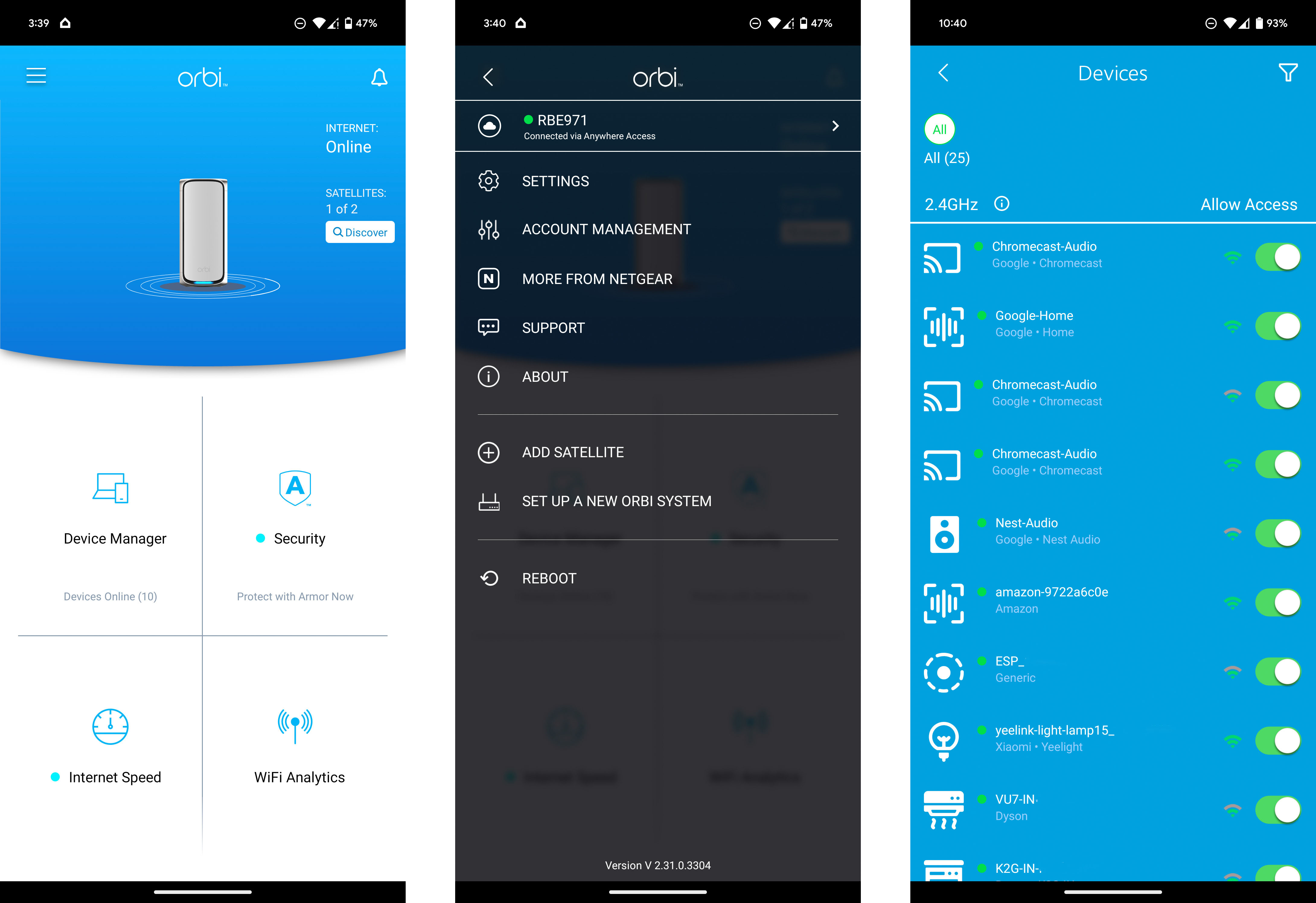
There were other problems with the Orbi 970; the router would disconnect frequently, and it wasn't until a firmware update (build V9.10.2.3_1.1.13) that it started delivering a stable connection. There's no way to change the region either, and I found this to be an irksome limitation.
Netgear's Armor software has extensive security controls, but you only get a year's worth of access before you need to shell out $99 annually to use the service. Similarly, Smart Parental Controls has a lot of useful tools that let you manage your kids' internet usage, but it has just a 30-day trial, and you'll need to pay $69 a year to access everything on offer. Given that you're paying at least $1,699 for this mesh system, Netgear should have bundled three years of access to both services as standard.
Netgear Orbi 970 (RBE973S): Performance
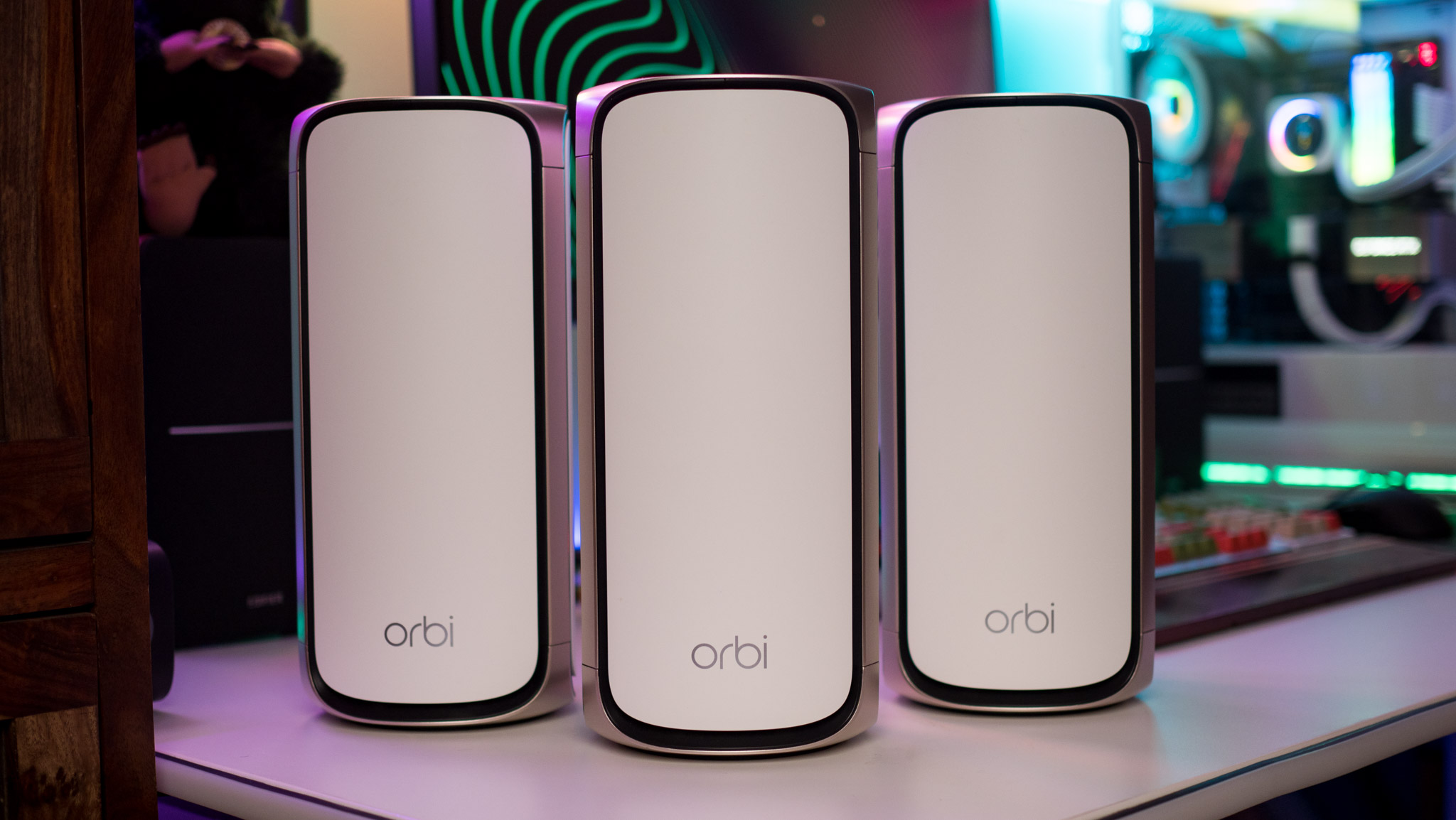
The Orbi 970 is the fastest router I tested by a significant margin. That was always going to be the case considering the hardware on offer, and most of the time I was using the mesh system, it felt like my Gigabit internet connection was the bottleneck. The Orbi 970 is designed for multi-Gigabit connectivity in mind, and with a few providers like Comcast and AT&T now delivering 2.5Gbps plans to consumers, the Orbi 970 is a great choice if you're mulling an upgrade.
I have a 10GbE home network that covers the DiskStation DS923+ (with a 10GbE networking card) and two gaming rigs. The rest of the devices that are connected over Ethernet — TVs, PlayStation 5, and security cameras — have Gigabit ports, and that's unlikely to change anytime soon. Anyway, wired performance of the Orbi 970 is outstanding; it was able to deliver consistent bandwidth when transferring large amounts of data between devices, and I didn't see any issues in this area.
I would have liked two 10GbE ports on the back of the router, but other than that, there are no drawbacks with the Ethernet side of things. Switching over to wireless, the Orbi 7 delivered outstanding coverage — more so than any other mesh system I tested to date — and I got better bandwidth on all the Wi-Fi 7 devices I tested. I used the OnePlus Open, Xiaomi 13T Pro, Vivo X100 Pro, and the iQOO 12 as client devices, and an ASUS Maximus Z790 motherboard that had a Wi-Fi 7 modem (paired with an Intel Core i5-14600K) that served as the workstation.
Unlike standalone routers, the Orbi 970 uses Netgear's automatic band switching tech to dynamically change bands and channel width on the fly to deliver the best throughput, and while you miss out of configurability, you get standout connectivity anywhere in your house. The Orbi 970 easily delivered Gigabit speeds throughout my home, going up to 926Mbps at 20 feet away, and 500Mbps at a distance of 50 feet. The bandwidth peters out once you cross 75 feet from a node, but I still managed to see over 150Mbps.
Ideally, a 2-pack should have more than adequate coverage for large houses, and while it is costly, the Orbi 970 managed to deliver much better bandwidth consistently than any other router I used to date. Even if you don't have a lot of Wi-Fi 7 devices at the moment, you should see a difference when switching to the Orbi 970.
Netgear Orbi 970 (RBE973S): The competition
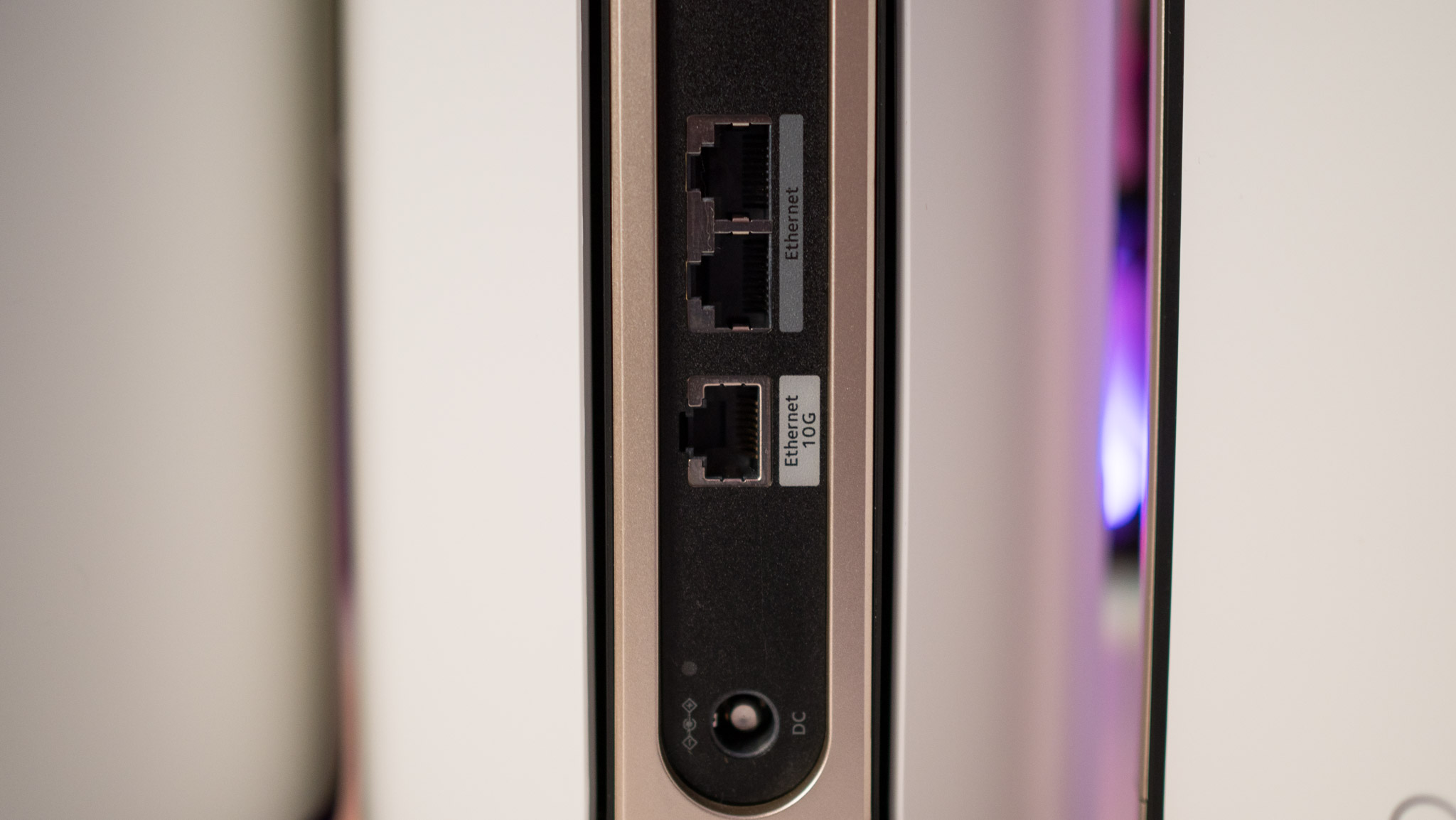
If you're looking to upgrade to Wi-Fi 7 and don't want to spend quite as much as the Orbi 970, you should take a look at the TP-Link Deco BE95 (BE33000). The BE95 has addressable bandwidth of up to 33Gbps, and you get two 10GbE ports at the back and an SFP+ port. There are two 6GHz bands with 320MHz channels, and you can easily connect up to 200 devices. A 3-pack costs $1,799 — $500 less than the Orbi 970 — and a 2-pack is $1,199.
Netgear Orbi 970 (RBE973S): Should you buy it?
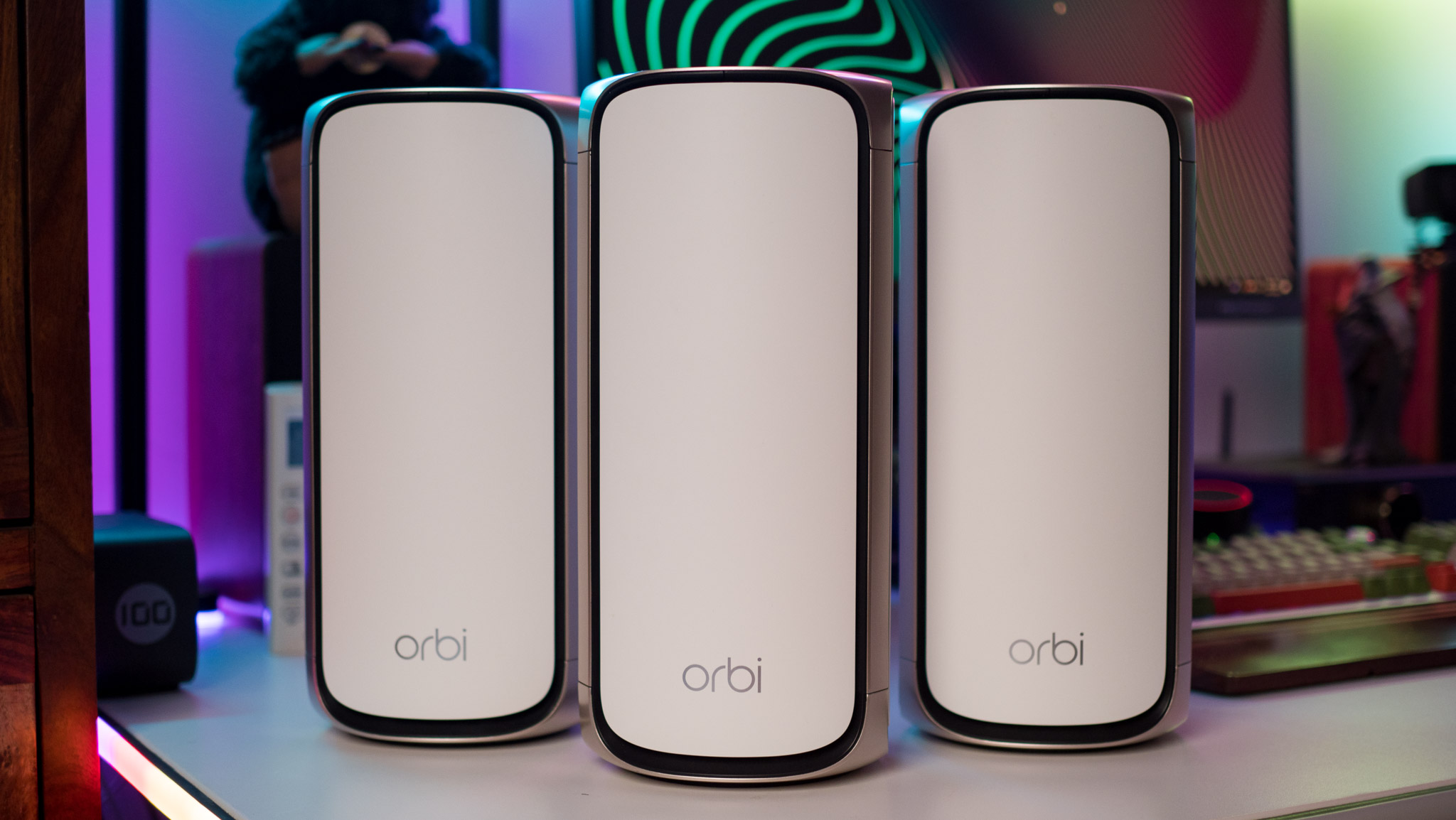
You should buy this if:
- You want blazing-fast connectivity over Wi-Fi 7
- You need reliable coverage throughout your home
- You want a mesh system that's easy to set up and use
- You need a lot of 2.5GbE ports
You shouldn't buy this if:
- You need two 10GbE LAN ports
- You don't have a lot of Wi-Fi 7 devices
- You want a mesh system with a good value
Ultimately, the Orbi 970 is a great technical showcase of what's possible with Wi-Fi 7 today. The router isn't short of issues, but it excels at delivering incredible connectivity to every corner of the house. It is straightforward to set up and use, and you won't have to constantly fiddle with the settings.
My biggest quibble with the Orbi 970 is that it has a single 10GbE LAN port; this limitation means you can't set up a 10GbE backhaul to both satellites without a switch, and Netgear should have done better in this area. I would have also liked the ability to set up SSIDs for individual bands, and at least a three-year subscription to Netgear Armor considering what you're paying for the mesh system.
Of course, if you don't really want the latest tech, you should take a look at the best Wi-Fi 6E mesh routers — they do a great job providing reliable coverage, and even standalone Wi-Fi 7 routers are a much better value. But if you have a large home and want a mesh system that covers up to 10,000 sq. ft., the Orbi 970 is the way to go — if you can justify that sticker price.
The Orbi 970 is one of the fastest mesh systems you can buy today, and it delivers outstanding coverage. It is easy to set up and use, and if you want to upgrade to Wi-Fi 7 right away, there's a lot to like.





